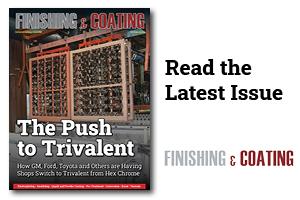A manufacturer and powder coater of aluminum balconies and rails can continue its pursuit of getting its insurance company to pay for faulty coatings on the products.
A three-judge panel of Wisconsin’s Court of Appeals District I reversed a decision by a lower court in Frankenmuth Mutual Insurance Co. v. Midwest Stairs & Iron Inc., and ruled that the insurance company must defend the metal fabricator against customer claims arising from the use of paint on aluminum balconies that bubbled and peeled.
Midwest sought nearly $2 million from Frankenmuth in 2020 for damage to the balconies when customers complained. Frankenmuth denied the claim and eventually sued Midwest to get a court order on its coverage obligations.
The Wisconsin Court of Appeals ruled that the lower court was in error when it found that — because the paint and balconies were an integrated system — Midwest did not sustain any property damage.
The case history from the court documents include:
Midwest is a local steel, aluminum, and stainless steel metal fabricator serving the greater Midwest area. In addition to several other products, Midwest fabricates an aluminum balcony, which includes a deck and railing, and is painted with a powder coated finish. The powder coated finish applied to the balconies requires a multi-step paint application process. Prior to 2019, Midwest had the balconies painted outside of its shop by a subcontractor. However, by April 2019, Midwest moved the painting process to its shop, and Midwest chose a process designed and developed by Milport Enterprises, Neutral Solution, and Chemtec North America, LLC. The painting process that Midwest began using in April 2019 used a chemical additive known as Ecophor B700 Plaforization. This chemical additive is referred to shorthand simply as “plaf.” “Plaf is the product which helps the paint stick to the aluminum manufactured balconies.” Milport supplied the plaf for the painting process.
In March 2020, Midwest noticed that the paint in the powder coated finish on some of the aluminum balconies sitting in its shop was bubbling and cracking, causing the paint to peel and flake off, and Midwest contacted Milport and Neutral Solution about fixing the problem. Midwest’s president, Howard Wurgler, indicated that, in some instances the issue was bigger than a simple touch up paint job, and the paint was peeling off in “sheets” and “large chunks,” which necessitated a complete replacement of the deck boards. Midwest’s vice president, Tim McCaigue, provided a similar account at his deposition.
Following March 2020, Midwest received complaints—and in one instance even received a demand letter—from its customers about the paint peeling and cracking on balconies that had been installed at several different projects—consisting mainly of apartment buildings and senior living facilities— that had been completed during 2019 and earlier in 2020. In some instances, Midwest handled the installation of the balconies at the project, and in others, Midwest had simply supplied the balconies and the installation was handled by someone else on the project. Ultimately, Midwest either repaired or, as in most cases, replaced hundreds of balconies at several properties, and it has continued to receive complaints from customers as late as December 2020 about peeling and flaking paint on balconies painted using the plaf from Milport.
During this same timeframe, Midwest continued to contact Milport and Neutral Solution for an answer to the paint adhesion problem. Eventually, Midwest determined that Milport’s plaf was causing the paint to peel and crack, and after Midwest eliminated Milport’s plaf from the painting process and, in fact, implemented an entirely new process designed and developed by Chemetall in June 2020, Midwest stopped having issues with peeling and cracking paint in the powder coated finish on the balconies.
Midwest had a Commercial Package Policy with Frankenmuth, effective January 1, 2020, to January 1, 2021. This policy included a Commercial General Liability Coverage policy (CGL policy), and a Business Errors and Omissions Liability Endorsement (E&O policy). Midwest applied for the E&O policy on June 3, 2020, and the policy was made retroactive to May 27, 2020. At the time that Midwest completed the application for the E&O policy, it answered “No” to the question, “Has any errors and omissions claim been made or is now pending against the above applicant?”
On July 9, 2020, Midwest submitted a claim (a Liability Loss Notice) to Frankenmuth under the insurance policy that Midwest had with Frankenmuth. Midwest described the loss as “[p]aint flaking off balconies; multiple locations in multiple states; possible $2 million in damage.” Frankenmuth denied the claim. Midwest requested that Frankenmuth reconsider its denial of coverage, and Frankenmuth again denied Midwest’s claim. However, Frankenmuth did agree to defend Midwest against any claims made by its customers against Midwest.
Frankenmuth subsequently filed this declaratory judgment action and moved for summary judgment, asking for a declaration that it had no duty to defend or indemnify Midwest for any claims from customers arising from the peeling and cracking paint. Frankenmuth argued that neither the CGL policy nor the E&O policy covered Midwest’s claim. In particular, Frankenmuth argued that there was no initial grant of coverage under the CGL policy and, alternatively, the business risk exclusions found in the CGL policy applied and barred coverage. Frankenmuth further argued that the prior acts provision and the known loss doctrine precluded coverage under the E&O policy.
The court reversed the decision of the lower court, writing “We conclude that Midwest’s claim is covered by its insurance policy with Frankenmuth and no exclusions apply to preclude coverage. Consequently, we further conclude that Frankenmuth has a duty to defend Midwest against any claims arising from the paint failures and, if applicable, a duty to indemnify Midwest against those claims. Accordingly, we reverse the circuit court’s order granting judgment in favor of Frankenmuth, and we remand for further proceedings consistent with this opinion.”



































